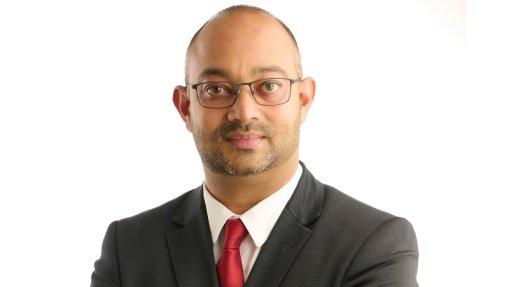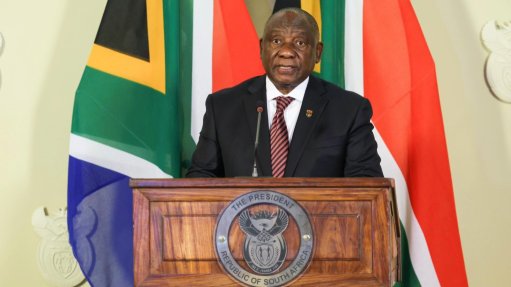Industry cautiously optimistic following Godongwana’s maiden Budget

AfriSam's Richard Tomes, Former SA Finance Minister Trevor Manuel and Econometrix's Dr Azar Jammine comment on the 2022 National Budget. Video: Creamer Media's Kutlwano Matlala. Editing: Creamer Media's Nicholas Boyd.
In spite of South Africa’s construction sector being one of the country’s slowest-growing sectors of the last decade, economic consultancy Econometrix chief director and economist Dr Azar Jammine remains optimistic that, following the National Budget speech earlier this week, the South African government has reiterated its commitment to investing in infrastructure spend.
The announcement of the Economic Recovery and Reconstruction Plan in 2020 included 51 projects, worth R340-billion. This subsequently increased to include an additional 55 well-defined projects, worth R595-billion at the time the Medium-Term Budget Policy Statement was published in November 2021.
Taking this into account, Jammine tells Engineering News that “if only a small fraction of these projects see the light of day, it will still have an enormous impact in boosting overall capital investment and improving the delivery of services in South Africa”.
To put it into perspective, he explains that even if only R5-billion of the cumulative R935-billion pipeline materialises, it is equivalent to 126% of yearly total fixed investment in the country which, if spread out across ten years, will amount to a 12.5% increase in capital investment.
In turn, this would boost economic growth by 2% a year and result in the creation of thousands of new jobs.
Jammine comments, however, that “one can only hope” that the projects materialise, as it has the potential to be “the most important and relevant” game-changer in the South African economy.
Former South African Finance Minister Trevor Manuel, meanwhile, suggests that one should be cautious when considering the lead time for these projects, as most of the planned infrastructure projects require the acquisition of land for service and require adequate planning.
“It’s frequently impossible to do this with a lead time that’s shorter than three years before equipment is on site. And the worrying thing is that [South Africa] tends to follow the announcements, which come before the three-year lead time,” he tells Engineering News, stressing that discussions need to be held to “shorten the timeframe” on these projects.
“I think we underspend on all kinds of infrastructure, roads and bridges and even our energy infrastructure. When we do spend, we overspend, and no country can spend on that basis. We need to build into the efficiencies of spending and ensure that it’s not just infrastructure spend, but that it’s efficient infrastructure spend, which creates employment and provides economic outputs in the present,” Manuel elaborates.
AfriSam sales and marketing director Richard Tomes, meanwhile, says the gaps in infrastructure across the nation are also largely affected by the country’s skills shortage.
“Things aren’t looking positive, and it’s largely because of the lack of actual infrastructure spend that has caused large [construction] companies to find themselves where they are,” he comments.
However, Jammine comments that the relationship between the private sector and the government in terms of cooperating to implement such infrastructure projects, has improved.
“I believe the government itself has experienced a change in the last year or so in terms of wanting to embrace the private sector more actively to assist in implementing projects.
“The government has come to recognise that it itself is not capable of carrying through with these projects on its own, and it was one of the most the most forceful aspects of the State of the Nation Address of President [Cyril] Ramaphosa when he said that it's the private sector that creates jobs, not the government,” Jammine explains.
He suggests that what the private sector must now do is “to try and engage government more actively” because, theoretically, the private sector should receive a far better reception than has been the case in the past.
“With its superior skills, [the private sector] should be able to actually ensure more work for itself and more success in actually improving the overall state of the economy and service delivery.”
Manuel, meanwhile, is confident South Africa can “transcend the notion that the private sector is the problem”, considering that the sector is “fundamentally important”.
Finance Minister Enoch Godongwana, he adds, “argued issues in the Budget that will help us to understand this”, which Manuel says is further supported by Ramaphosa’s State of the Nation Address earlier in February, during which he stated that “the private sector creates employment”.
Manuel is hopeful that the government and the private sector can “sit down and talk” about the issues the country is facing, so that it can focus on the planning, the implementation and the outcomes.
Tomes supports Manuel’s sentiment, adding that he believes that, if government and the private sector could work more closely, South Africa could potentially see a reestablishment of trust between government and the private sector.
“There is a lot of potential, and there is a lot of ability within the private sector to help boost our infrastructure spend and boost our economy. But we do need some certainty around policy,” he tells Engineering News.
One such example is the uncertainty that surrounds land expropriation, which Tomes says the construction industry requires clarity on in order to move forward with projects.
“We need some finalisation on some of these policies, because there is a willingness from the private sector to invest in and to spend, but for that to happen, we need policy certainty and we need a reestablishment of trust between government and the private sector,” Tomes says.
Commenting on structural reform and the construction sector, Jammine notes that the civil engineering industry is “by far the most capital-intensive sector in the economy”.
Though it only accounts for roughly 2.5% of South Africa’s gross domestic product, it accommodates 82% of the formal sector’s jobs and work.
While the poor, especially, have suffered in a slow economic environment exacerbated by the Covid-19 pandemic, Jammine says the good news is that, proportionately speaking, government intends to grow its capital assets in the coming year by 24.5%.
However, he notes that government will need to divert its focus away from paying public servants and move these funds towards infrastructural spend, which “is going to pose one of the big challenges of the coming Budget,” says Jammine.
Growth in remuneration of employees in the public service is projected at an average of 1.8% per year, which while below the inflation rate, prompts Jammine to question whether government will be able to afford to divert funds towards capital investment.
More generally, looking at the Budget and where public sector infrastructure investment is going to take place over the next three years, the official figure is R812.5-billion. A year ago, that figure was R850-billion.
“That picture has remained unchanged for the last five years, and yet inflation has been eroding the real value of that public sector investment,” he comments.
Of this amount, 15% will be directed towards energy, 16% towards water and sanitation and 38.4% towards transport and logistics.
“At the end of the day, the real crunch is whether we'll be able to embark on the structural reforms that are needed to turn the economy around,” Jammine states.
“We need to improve skills, outcomes and our educational outcomes to address the skill shortage. We have to clamp down on State capture and corruption and the type of deployment that we have seen, especially under the Zuma administration,” he adds.
In conclusion, Jammine believes Godongwana’s maiden Budget was “highly satisfactory, with no harm” and that upside risks include the realignment of South Africa’s politics to expedite reform, the take-off in infrastructure investment and that the commodity price boom has, so far, lasted longer than expected.
Article Enquiry
Email Article
Save Article
Feedback
To advertise email advertising@creamermedia.co.za or click here
Press Office
Announcements
What's On
Subscribe to improve your user experience...
Option 1 (equivalent of R125 a month):
Receive a weekly copy of Creamer Media's Engineering News & Mining Weekly magazine
(print copy for those in South Africa and e-magazine for those outside of South Africa)
Receive daily email newsletters
Access to full search results
Access archive of magazine back copies
Access to Projects in Progress
Access to ONE Research Report of your choice in PDF format
Option 2 (equivalent of R375 a month):
All benefits from Option 1
PLUS
Access to Creamer Media's Research Channel Africa for ALL Research Reports, in PDF format, on various industrial and mining sectors
including Electricity; Water; Energy Transition; Hydrogen; Roads, Rail and Ports; Coal; Gold; Platinum; Battery Metals; etc.
Already a subscriber?
Forgotten your password?
Receive weekly copy of Creamer Media's Engineering News & Mining Weekly magazine (print copy for those in South Africa and e-magazine for those outside of South Africa)
➕
Recieve daily email newsletters
➕
Access to full search results
➕
Access archive of magazine back copies
➕
Access to Projects in Progress
➕
Access to ONE Research Report of your choice in PDF format
RESEARCH CHANNEL AFRICA
R4500 (equivalent of R375 a month)
SUBSCRIBEAll benefits from Option 1
➕
Access to Creamer Media's Research Channel Africa for ALL Research Reports on various industrial and mining sectors, in PDF format, including on:
Electricity
➕
Water
➕
Energy Transition
➕
Hydrogen
➕
Roads, Rail and Ports
➕
Coal
➕
Gold
➕
Platinum
➕
Battery Metals
➕
etc.
Receive all benefits from Option 1 or Option 2 delivered to numerous people at your company
➕
Multiple User names and Passwords for simultaneous log-ins
➕
Intranet integration access to all in your organisation



















